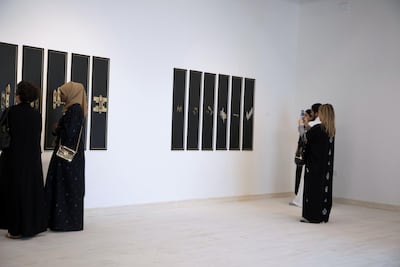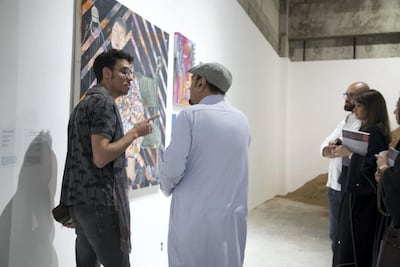“Working within a system which is not accommodating to artistic practice, people are really shaping new formats for existing and for doing things,” says Vassilis Oikonomopoulos of the exhibition he guest-curated for 21, 39, the Jeddah art events that opened on Wednesday. "This kind of energy and vibrancy of the city was the initial part of 'Refusing to Be Still': something that is in perpetual motion, always trying to move forward or sideways or somewhere, in order to avoid being static.”
21, 39 is the programme of art exhibitions and talks that is now in its fifth edition in Jeddah, Saudi Arabia’s liberal port city on the Red Sea. Like much else in the art scene here, the event grew organically: when the Saudi Art Council started the initiative, other events and exhibitions began happening around it.
The main exhibition is held in unused spaces in the Gold Moor Mall, an otherwise nondescript shopping centre along King Abdul Aziz Road, the main drag of Jeddah, which runs parallel to the coastline. Last edition a new venue was added: the crumbling traditional house Rabat Khunji in Al Balad, the city’s UNESCO Heritage-protected old town. Rabat Khunji this year hosted an architectural presentation by the Saudi studio Bricklab that examined the meeting of old and new — the very leitmotif of the show, and, it seems, of this moment in art in Jeddah.
_______________
Read more:
Changing Saudi art scene: New arts complex to open in Jeddah
Your guide to Dubai's Gulf Photo Plus photo week
Dhaka Art Summit lauds Bangladesh’s cultural heritage
_______________
Change is the name of the game in Saudi: Crown Prince Mohammed bin Salman has signalled headline-grabbing relaxations of rules — most famously allowing women to drive — capping a period of smaller scale reforms away from the strict Wahhabism of even 10 years ago. Most malls in Jeddah, for instance, are now mixed gender, and women walk around with their hair uncovered and their abayas open, encountering no interference or ill will.
Jeddah’s artists are looped into this narrative of change, but unlike other “emerging art scenes,” Jeddah’s feels different. It is less hungry for international attention and more keen to hold on to the elements that have so far constituted it: youth, self-organisation, a fascination— both critical and not — with Saudi as subject, and a willingness to be political about matters confronting other Arab states. Hayy, Art Jameel’s new centre that opens in 2019, takes the form of a neighbourhood, bringing together disparate entities rather than imposing the single view of an art institution.
On the roving bus tour of international visitors who arrive for the previews, I was told I was the only foreign journalist — the rest were “friends,” people who had been involved in supporting or working with Saudi artists in years past. We took in the Gold Moor Mall, Rabat Khunji, and the Pepsi-Cola factory, where a resplendent dinner for 300 was held the opening night; a solo show of Ahmed Mater; Makan, a new nonprofit outpost of Hafez Gallery; and Athr Gallery, which hosted the absolutely thrilling show “The Clocks Are Striking Thirteen.” Many of the artists in the Athr exhibition had been in previous 21, 39's and their maturity was evident in the confidence of scale, materiality and narratives — around Syria, colonialism, spirituality — chosen.
This feels like the better purpose of 21, 39: less an international showcase for Saudi art but a means by which the Jeddah art scene works together and grows, whether on its own or with others.
What the law says
Micro-retirement is not a recognised concept or employment status under Federal Decree Law No. 33 of 2021 on the Regulation of Labour Relations (as amended) (UAE Labour Law). As such, it reflects a voluntary work-life balance practice, rather than a recognised legal employment category, according to Dilini Loku, senior associate for law firm Gateley Middle East.
“Some companies may offer formal sabbatical policies or career break programmes; however, beyond such arrangements, there is no automatic right or statutory entitlement to extended breaks,” she explains.
“Any leave taken beyond statutory entitlements, such as annual leave, is typically regarded as unpaid leave in accordance with Article 33 of the UAE Labour Law. While employees may legally take unpaid leave, such requests are subject to the employer’s discretion and require approval.”
If an employee resigns to pursue micro-retirement, the employment contract is terminated, and the employer is under no legal obligation to rehire the employee in the future unless specific contractual agreements are in place (such as return-to-work arrangements), which are generally uncommon, Ms Loku adds.
Specs
Engine: Electric motor generating 54.2kWh (Cooper SE and Aceman SE), 64.6kW (Countryman All4 SE)
Power: 218hp (Cooper and Aceman), 313hp (Countryman)
Torque: 330Nm (Cooper and Aceman), 494Nm (Countryman)
On sale: Now
Price: From Dh158,000 (Cooper), Dh168,000 (Aceman), Dh190,000 (Countryman)
RESULT
Valencia 3
Kevin Gameiro 21', 51'
Ferran Torres 67'
Atlanta 4
Josip Llicic 3' (P), 43' (P), 71', 82'
The alternatives
• Founded in 2014, Telr is a payment aggregator and gateway with an office in Silicon Oasis. It’s e-commerce entry plan costs Dh349 monthly (plus VAT). QR codes direct customers to an online payment page and merchants can generate payments through messaging apps.
• Business Bay’s Pallapay claims 40,000-plus active merchants who can invoice customers and receive payment by card. Fees range from 1.99 per cent plus Dh1 per transaction depending on payment method and location, such as online or via UAE mobile.
• Tap started in May 2013 in Kuwait, allowing Middle East businesses to bill, accept, receive and make payments online “easier, faster and smoother” via goSell and goCollect. It supports more than 10,000 merchants. Monthly fees range from US$65-100, plus card charges of 2.75-3.75 per cent and Dh1.2 per sale.
• 2checkout’s “all-in-one payment gateway and merchant account” accepts payments in 200-plus markets for 2.4-3.9 per cent, plus a Dh1.2-Dh1.8 currency conversion charge. The US provider processes online shop and mobile transactions and has 17,000-plus active digital commerce users.
• PayPal is probably the best-known online goods payment method - usually used for eBay purchases - but can be used to receive funds, providing everyone’s signed up. Costs from 2.9 per cent plus Dh1.2 per transaction.
In-demand jobs and monthly salaries
- Technology expert in robotics and automation: Dh20,000 to Dh40,000
- Energy engineer: Dh25,000 to Dh30,000
- Production engineer: Dh30,000 to Dh40,000
- Data-driven supply chain management professional: Dh30,000 to Dh50,000
- HR leader: Dh40,000 to Dh60,000
- Engineering leader: Dh30,000 to Dh55,000
- Project manager: Dh55,000 to Dh65,000
- Senior reservoir engineer: Dh40,000 to Dh55,000
- Senior drilling engineer: Dh38,000 to Dh46,000
- Senior process engineer: Dh28,000 to Dh38,000
- Senior maintenance engineer: Dh22,000 to Dh34,000
- Field engineer: Dh6,500 to Dh7,500
- Field supervisor: Dh9,000 to Dh12,000
- Field operator: Dh5,000 to Dh7,000
The candidates
Dr Ayham Ammora, scientist and business executive
Ali Azeem, business leader
Tony Booth, professor of education
Lord Browne, former BP chief executive
Dr Mohamed El-Erian, economist
Professor Wyn Evans, astrophysicist
Dr Mark Mann, scientist
Gina MIller, anti-Brexit campaigner
Lord Smith, former Cabinet minister
Sandi Toksvig, broadcaster
More coverage from the Future Forum



